Whowatch Part 23
Started Spider-Man 2, love it, started This Is How You Lose the Time War, love it, expect more on both in the near future.
City of Death
The Witchfinders
It Takes You Away
The Battle of Ranskoor Av Kolos
Resolution
Spyfall
Orphan 55
Nikola Tesla’s Night of Terror
Fugitive of the Judoon
Praxeus
Can You Hear Me?
The Haunting of Villa Diodata
Ascension of the Cybermen
The Timeless Children
Revolution of the Daleks
“On one level it’s difficult to imagine how anyone thought this could have worked. Redoing the basic premise of the series so that a one-off villain from the novels replaces the Time Lords as the origin of the Doctor is never going to fly. It doesn’t matter how neat an idea it is. You can’t replace huge and iconic elements of Doctor Who’s mythology with random bits of novel lore. The weight of the thing being replaced is just so much larger than the thing that’s being used to replace it that it cannot ever work.”
-Elizabeth Sandifer
David: You well and truly warned me. Let no one say you didn’t.
Sean: Well, before we get to that, let’s first talk about Paris.
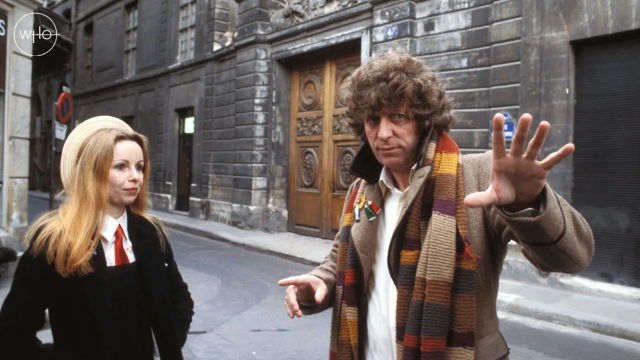
David: City of Death was pretty good! Lots of quality banter to be had. The actual walking about was pleasantly mundane in a way Who rarely gets, though a lot of the story’s purely utilitarian connective narrative tissue was a bit of a bore this time around. Points for the fakest punch of all time though, almost as fake as all those paintings made by computer The Doctor is none too pleased by.
Sean: It’s worth noting that City of Death was predominantly written by one of the greatest and most pessimistic minds Science Fiction has ever seen: Douglas Adams. Adams, at the time, was working as the script editor for Doctor Who and this was his second script. It was not credited to him for the simple reason that, much like many a Douglas Adams story, he was running late with actually writing the damn thing, so it had to be finished by frequent writer for the era David Fisher and the show’s producer, Graham Williams.
Among the things causing delays was the production of the serial Shada, which ended up being the Doctor Who equivalent of The Salmon of Doubt in that it was never finished due to Adams absconding from the plain of existence for better prospects. Unlike with The Salmon of Doubt, this is a metaphor. Nevertheless, City of Death highlights a lot of the things people love about Douglas Adams’ work from his quick wit to his imaginative vision of mundane science fiction. And, of course, John Cleese is there, reminding the dear reader that it was perhaps best that Adams not live to see the era of Twitter and Glinner.
As we noted back in WhoWatch 22, David has opted to experience a more truncated version of the Chibnall era purely because he wishes not to commit too much self harm. As such, I will be providing the old sport with some witty commentary on the episodes he skipped and he will respond in kind.
First up, The Witchfinders. In many regards, this is a high watermark for the era. Though, considering the era it’s in, it’s perfectly fine in terms of actual television. I honestly barely remember a thing about it bar that it involves witches and that Alan Cummings returns to Doctor Who after The Airzone Solution to play King James I, wherein he spends the majority of his time as a rather gross dude who frequently tries to proposition Ryan while being extremely English Monarch about this “Nubian prince.”
David: That is an extremely wild sentence to follow “high watermark for the era”, and yet I have no trouble believing you.
Sean: Next was It Takes You Away, wherein ALL HAIL THE HYPNOTOAD!
DAVID INSERT HYPNOTOAD GIF HERE

Ahem. Anywho, this episode is quite possibly the best story in the entire era in that it actually feels like it was made for Doctor Who and not for Generic Science Fiction Show What Has Time Travel In It. All told, it’s perfectly serviceable telly with a few interesting ideas crammed together. It marks the end of Ryan’s character arc of calling Graham his dad. And it has Graham come to terms with Grace’s death. It also has the Doctor get propositioned by a sentient universe whose avatar is a toad. So, you know. Highlight of the era, all downhill from here.
David: Part of me is mad you had me skip some of the only good episodes here - at least now I suppose I know what Ryan’s mention of a sentient universe was in the last episode of this batch - but we’re two months out from Good Doctor Who being a real thing again, so I don’t feel that bad about deciding not to linger here longer than necessary. I’d say maybe I’ll go back someday and watch them on my own time but, haha, no I won’t. Not when we have what we have next reminding me how things really work here.
Sean: The Battle of Russian Kramer is a hot mess. The second most blatant 'Oh god, what do we do' moments of the Chibnall era wherein there was clearly no plan to actually bring back Tim Shaw as the main baddie because he honestly cannot hold the fucking episode. I mean, good lord, where do you even start.
Oh wait, I know! You start with the episode’s fucking name! I mean, it’s called The Battle of Rancid Crap! The Battle of Regurgitation and Krunch. The Battle of Ritesh and Nihilist Steve Keep Our Only Resource, A Very Knowledgeable Octopus, Lurking Over Sean.
David: The Battle of Ranskoor Av Kolos is possibly the most perfunctory ‘season finale’ of anything I’ve ever witnessed; the closest thing I can imagine to an argument for it functioning as a capstone to a season of Doctor Who is it bringing Ryan and Graham’s character arc full circle by way of them putting somebody in the Phantom Zone together, but counterpoint, eat shit. Mix in a little nu-atheism for flavor (“YOU’RE the creators!”) they undercut at the very last anyway, a big dangerous macguffin with no payoff, and…I don’t think there’s actually anything else worth noting. The “Three thousand four hundred and seven years.”/“I bet the seven really dragged.” is about the closest we’ve gotten to a killer line in Series 11 though, so a thimbleful of kudos for that.
Sean: In many regards, this episode highlights the morality at the heart of the era of Doctor Who. Mainly that it’s perfectly fine to sentence someone to an eternal hell dimension, let them slowly suffocate to death, or even have them kill themselves. But to do the murder yourself, out of revenge, is wrong.
David: And that’s part of the thing of this whole era: the most purely self-righteous and ‘heroic’ Doctor ever, who’s in many ways the most morally askew of the whole batch? That would be a potentially really interesting idea if it was on purpose. The nicest thing I can say about Chibnall’s whole tenure is it’s littered, if sparsely, with chunks of interesting stories if approached with any skill or at least self-awareness.
Not this episode in particular to be clear, this one’s dumb to the core. But. Y’know. Broadly speaking.
Anyway, besides jotting down in my notes “Cole and Adegboyega…uh…actually really bring it” regarding Ryan’s reunion with his father, all I have on Resolution is a good line (“Allocated surrender period has expired! Consequence: exterminate!”) paired with the rock bottom (“I suppose we’ll have to have…a conversation.” “WAHT”). A lady who looks like someone I used to have a crush on gets Dalek tentacles, so that’d probably be a whole thing psychosexually speaking if I were paying more attention. I dunno, Dalek stuff happens.
Sean: It’s the episode where the Doctor refers to a Dalek as a “refugee” and is too chicken shit to have the makeshift Dalek use an actual plunger in its redesign. What is there to actually say about this?
Actually, that note about the plunger does highlight the core failing of the Chibnall era: it’s not campy enough. Sure, you have people like Stephen Fry and Alan Cummings lightening things up with their inherent campiness (“Vore is more powerful than most nations” and all that), but by and large the era has stripped all senses of camp from its very essence. And as such, you’re left with a dreary series that feels like the most drab thing imaginable. I mean, what happened to the fun?
David: Ostensibly it went into the Series 12 kickoff with an, I’ll say, allegedly rip-roaring pastiche of James Bond in Spyfall.
Sean: Oh boy.
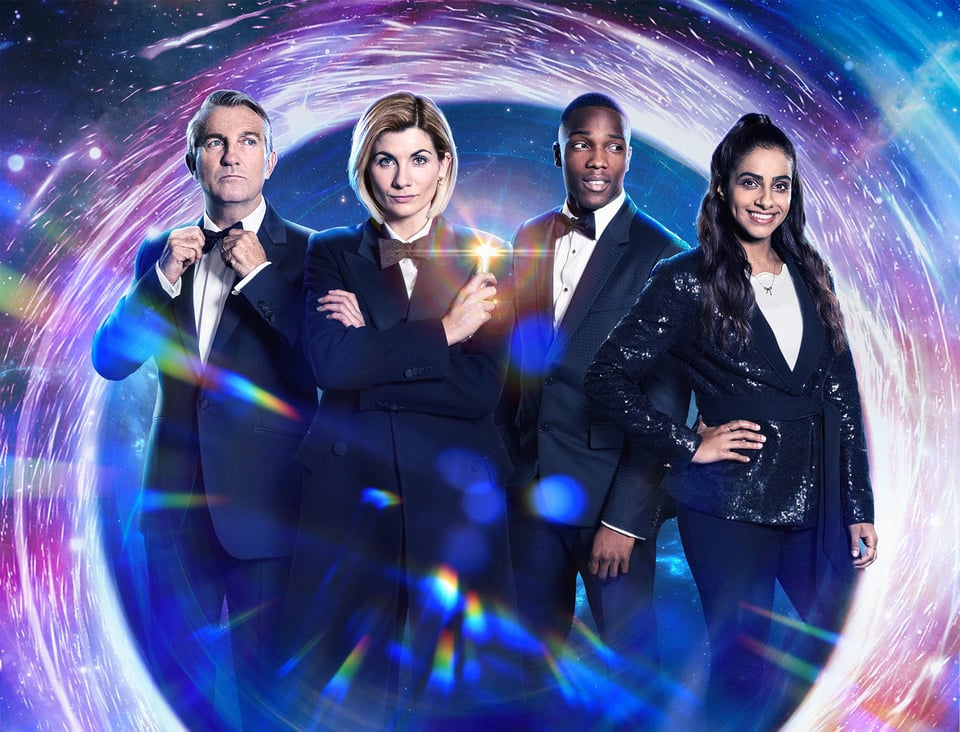
David: I will level with you. This is the least I have ever paid attention to Doctor Who. I was on my phone the controlling percentage of this two-parter, and that is not generally the way I chose to experience television. There wasn’t any specific thing that made me decide I was fully checked out on this one, I even have more notes on it I’ll get to momentarily than the last several. But something in my brain switched off here as hard as it ever has in the whole of Whowatch.
Sean: So, The Master’s back. And it appears that Chris Chibnall has not been paying any attention to the Capaldi era, because there’s no sense he’s experienced any change from the Michelle Gomez incarnation.
David: I know people have speculated he’s what Simm regenerated into and Missy was further down the personal timeline but I don’t have it in me to care. There were a full 30 seconds or so where I thought Sacha Dhawan might be magnetic enough to get me to enjoy his material in isolation, but while he seems like a good actor, this is not an occasion one rises to. Also he blew up Gallifrey because lol why wouldn’t we do that again but without a reason to care. Sure. Also also he is a Nazi and it is textually addressed that this is extremely weird and Doctor Who defeats him by having the Nazis realize he’s a brown man and put him in a concentration camp. Ok.
Sean: Yeah, even with a white actor, having the Master in an SS Uniform is a bridge too far. But on the note of concentration camps, it’s worth noting the other cruel horror at the heart of the Chibnall era: Historical Accuracy as Fetish Rather Than Morality! You see, among the historical figures the Doctor teams up with to defeat Vore is Noor Inayat Khan, a real life member of the French Resistance during WWII. She was captured by the Nazis and executed in Dachau. I bring this up for one simple reason: They filmed the execution for the episode.
David: I was gonna say that much more than the stuff with the Master, the Doctor being 100% cool with mindwipes again had me wondering if Chibnall truly skipped over significant chunks of Moffat. This however defies standard yuks or dunks. Simply perverse. I suppose if someone had a button to vent one of Chibnall’s brainfarts out of an episode that could only be used once this was indeed the time to press it, but…
Well, anyway, I have a little mini run-down of the half-decent stuff in this episode:
The monsters coming out of the walls should be better but it feels like an actual design choice that went wrong rather than pure laziness.
MAXIMUM CARNAGE
…there was even less than I thought. Also Yaz why did you casually ask if you could visit The Doctor’s home, she just said she ran away thousands of years ago? I know the answer is that someone had to be stupid enough to ask so the episode could end the way they wanted but why was it you?
Alright Sean, what now
Sean: Orphan 55… In many regards, the post apocalypse is one of the major landscapes for Children’s and Young Adult fiction. From classics like Lois Lowry’s The Giver and Cormac McCarthy’s The Road to more modern texts like Suzanne Collins’ The Hunger Games or James Dashner’s The Maze Runner. But perhaps the two major texts of post apocalypse fiction the core audience of Doctor Who would be engaging with at the time are Adventure Time and Steven Universe.
(In terms of timeline, Adventure Time began its proper broadcast mere days after The Eleventh Hour aired. [Its pilot was aired on Nickelodeon between Voyage of the Damned and Partners in Crime.] Steven Universe began just a few weeks before The Day of The Doctor. [The pilot released online a few days after The Name of the Doctor.] Steven Universe would have started airing its last batch of episodes a few days after The Timeless Children aired. Adventure Time, meanwhile, concluded its nine year run just a month before The Woman Who Fell to Earth.)
Adventure Time is perhaps the more obvious text when it comes to the post apocalypse. From its very opening credits, we know that this is a show set in the wake of the downfall of humanity from some cruel, horrific event. The series would then engage with the overall implications of this apocalypse on the world over a thousand years after its aftermath via the environment, the survivors, and more. In some regards, its vision of the cosmos is one of random chance and, at times, flippant cruelty. But at the same time, it is one fueled by pure imagination and wonder. It’s a truly strange world out there. But it’s always best to travel with a friend.
Steven Universe, meanwhile, positions itself (in its initial episodes) as an exploration of ruins. More specifically, it’s a show about engaging with a world that ended so very long ago. Throughout the show, our heroes are traveling the world looking for lost artifacts from a civilization that’s long gone. From statues to pyramids, we see a culture that has long since left the Earth.
Additionally, the show is about how to move on after the death of your mom and what that means (especially when the cause of death is childbirth). It’s a show about a boy growing up. But where Adventure Time had the boy off on his own with a pet dog/best friend, Steven Universe has its titular character live within civilization with his three moms. He’s not galivanting across the world seeking adventure. Steven loves adventure, but he’d be just as happy having adventures in the streets of his home town. It’s an empathetic show about the relationship between a small town and the supernatural/cosmic world it's a part of. In essence, it’s perhaps the single best follow up to Mark Frost and David Lynch’s Twin Peaks (not done by Frost/Lynch).
We can see the impact of both of these shows in the modern landscape of art and animation. From Infinity Train pushing the contrasting dichotomy of aesthetics and morality to its breaking point to Amphibia diving in more complex, problematic queer kids engaging with a strange world they must traverse and grow through. Equally, the shows have resulted in some more… monstrous implications. One can easily draw a line from Adventure Time’s mad cruel cosmos to the existence of Rick and Morty (not helped by the guy who played Lemongrab). Likewise, the ethics and power fantasy of Steven Universe can be misunderstood and corrupted completely, becoming Superman’s Son hugging Fascist Superman to get him to stop being a fascist.
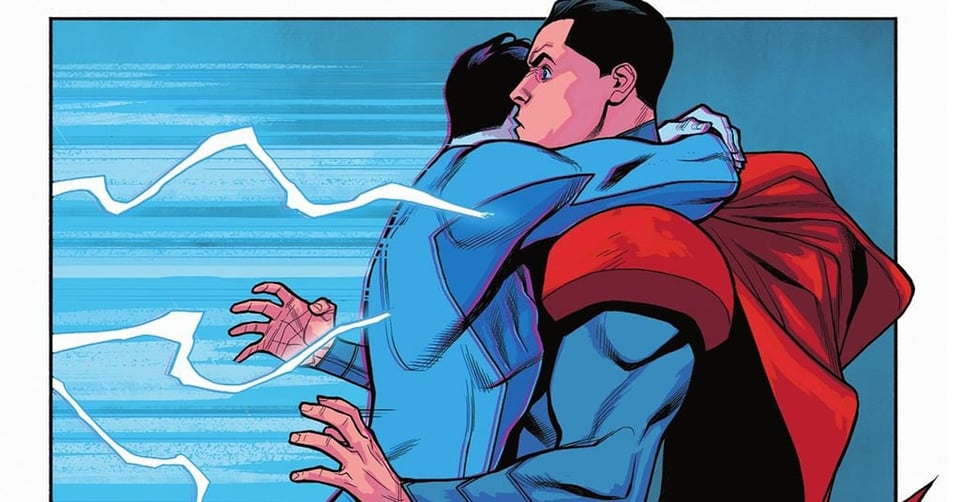
David: Mandatory RE: Jon Kent: my pain over the last two and a half years knows no bounds. I could’ve saved him. I could’ve saved him.
Sean: I’m sure you could’ve.
Bringing things back to Doctor Who, the previous two eras of the show have engaged with their respective landscapes of fiction. Davies was heavily influenced by the then recently concluded Young Adult series Buffy the Vampire Slayer in how to approach plot and character arcs. Likewise, Moffat’s entire era is a grappling with the relationship between the show and Children’s fiction. From Amelia Pond being a Wendy Darling-esque character whisked away from her normal life into a Spirit of Adventure to Clara Oswald essentially being the kind of person who desires to become fictional and the implications therein. Indeed, Moffat’s era matched the modern YA landscape that was growing around it by exploring problematic people trying to be better. From She-Ra and the Princesses of Power and everything to do with Catra’s arc to the aforementioned Amphibia and its tale of three girls learning to let go of their toxic relationship with one another to oh so much of The Owl House.
Where past Children’s and Young Adult fiction of the late 90s and early 2000s was content with Ed, Edd, ‘n Eddy or Billy and Mandy or Danny Phantom remaining in their place unchanged, modern Children’s and Young Adult fiction has opted for longform storytelling wherein people change episode to episode. But stories have endings, as they must. If not, they corrode into monstrosity and cruelty. They become less works of fiction to enjoy and more akin to an addiction one must horde and covet. To keep reading to see what happens next, even if the past seventy three episodes have been, at best, serviceable. Because you just have to know what happens next!
Ultimately, the point isn’t to make a good story (whether that be the absurdist madness of Teen Titans GO! or the serialized Body Horror Sci-Fi War Epic Animorphs) but rather to fill in the continuity for the purpose of either egomania or mere content. As a result, you end up with stories like The Rise of Skywalker where the importance lies primarily in expanding the lore with shocking reveals and insular character relationships, Stranger Things where it’s good because it reminds you of the 80s when you were a kid and nostalgia is always good, or Secret Invasion that seems to exist solely because some studio executive said it had to. Not art so much as the creations of algorithms and computers. (Doctor Who was offhandedly taking the piss out of this all the way back in, well, City of Death.)
Which brings us back to the Chibnall era. With regards to its relationship to Children’s and Young Adult fiction, there seems to be a rather large disinterest in it. Sure, the show got Malorie Blackman and Maxine Alderton to write an episode and some spin off material is engaged with the modern landscape, but nothing about the show’s aesthetics or interests highlights an understanding of where things are in the landscape.
This is no more demonstrated than in Orphan 55, an episode where the reveal is that this is set on a post apocalyptic Earth where all life has died save for the evil monsters of the episode who are trying to kill the people vacationing on the resort. There’s no sense of Adventure Time’s mad cosmos or Steven Universe’s empathetic reflection. It’s just a generic alien planet. Just a gravel quarry. And, given this is the other episode with a crap production, not that good of one.
David: I’m going to assume you put more thought into all of that than went into Orphan 55. Next one’s Nikola Tesla’s Night of Terror, which is the kind of title I’d bet would signify some decent middle-of-the-road fun under RTD’s tenure, a lesser but not outright broken Moffat era episode, and something absolutely insufferable here.
Sean: Well, it’s more forgettable than insufferable. Honestly, the only thing of note is that it posits that Tesla and Edison had a friendly rivalry rather than Edison being a fucking monster who stole everything he invented, bumped out the competition, and killed an elephant.
So…
Remember David when I said John Barrowman was never coming back?
David: That’s right, Sean. You did!
Sean: I lied.
David: I’ve never watched Commando but I’m imagining Schwarzenegger saying that. And worse than ever! More viscerally revolting a sight than the trash CGI Judoon we see at the start of the episode, and I even remember thinking ‘aw c’mon, the Judoon are fun, don’t drag them into this’. Harkness vomiting out lore hints that don’t really pay off in any coherent way are small potatoes though compared to the real nonsense going on here. Which I spoiled myself on when I looked up the co-writer, saw ‘okay this IS the Demons of the Punjab guy, that explains why a bunch of this isn’t so bad’, and right below it said who Jo Martin was playing. Fortunately I’m immune to disappointment by now, but I assume this was quite something when the episode aired. Fugitive of the Judoon’s one decent enough bit: “Is there even a word for how dumb you are?” “Doctor?”
Sean: It was… something. In many regards, one can feel the rewrites Chibnall did on this episode all over the place. And where they go… oh boy.
David: I’ve seen people complain about this ‘breaking the continuity’ not just in any larger sense but in terms of there being no reason for the TARDIS to be a phone booth, but you can no prize that in five seconds flat with ‘Hartnell was instinctively drawn to the one he’d used in a past life without knowing it’. Least of the problems here. The Time Lords lending extra regeneration energy in The Time of the Doctor is more of a question mark, but as we’ve established, Chibnall doesn’t exactly seem like a big Moffat guy.
Sean: It’s worth noting that while we’re inferring Chibnall wasn’t that big of a Moffat guy from the text rather than engaging in any interviews Chibnall gave, it is widely known that John Barrowman fucking hates Steven Moffat’s guts and spent the time between Torchwood: Miracle Day and Fugitive of the Judoon flat out lying about how Moffat was blocking Captain Jack’s return because the cultural narrative around Moffat is that he’s the devil and ruins everything he touches. Actually sitting through Fugitive of the Judoon, one gets the impression that the real reason was Barrowman fucking sucks as an actor. He doesn’t chew the scenery so much as pleads with the audience to love him. And sadly, this would not be the last we’d see of him.
But before we get to that, Praxeus. It’s worth noting that this aired on February 2, 2020. This story is about an Asian woman (who’s actually an Alien) spreading a virus all around the earth that, if breathed in, will instantly kill people. It’s worth noting that history often likes to mock people.
David: Mm-hmm, cool, coolcoolcoolcoolcoolcoolcoolcoolcool.
Sean: Did I mention the guy who did Kerblam! wrote this?
David: Coolcoolcoolcoolcoolcoolcool.
Sean: Can You Hear Me? is very much an episode with things that should make me interested like science fiction engagements with mental health or giving Yaz an actual bit of character work. But the actual episode… doesn’t? It’s just… there. We also get the one bit of foreshadowing for what happens in The Timeless Children prior to the penultimate episode.
David: In any other season this would be a serviceable bridge between the real stuff that pisses out at the climax and feels limper in the rearview; in the lineup you’ve given me, nothing short of an oasis. There’s suspense! A modicum of cleverness! Some character work! Motivated and occasionally inspired directorial decisions by Emma Sullivan who just did - checks notes - that new One Piece show, huh. The villains are pretty threatening and have a fun gimmick! This isn’t a standout episode in the sweep of the series, but feels like the product of some other world where the Chibnall era was broadly if unremarkably competent and frequently fairly entertaining television that rose to the substitute-RTD niche it envisioned for itself.
Sean: In the original plan for 'David Can Skip Around,' I had David not watch the next two episodes. Though they technically form the first two parts of The Lone Cyberman Trilogy, they’re rather superfluous in the grand scheme of things. But then I remembered the flashback bits of the next episode, so I had David just skip The Haunting of Villa Diodati. It’s Gothic, but for straight people. The only notable thing about it is that in a story where a corpse like Cyberman is stalking the halls the night Mary Shelly came up with the story of Frankenstein, it decides to hinge the great man theory of history, the one person whose life, if lost, would be detrimental to the universe… on Percy Shelly. I mean, I guess that one poem Alan Moore used in Watchmen was good and he had some interesting ideas, but come the fuck on. Mary is literally right there, and the episode does jack shit with her, her sister, or Lord Byron. (Ok, it does a vague 'I’m not in a toxic relationship with you anymore' arc with the sister and Byron, but it’s far too straight and boring to be more than generic.)
David: Ascension of the Cybermen opens with a mentally ill teenager getting himself and several other people killed, which primes you to expect something more attention-grabbingly awful. This is not in fact the case. There is on balance nothing neither good nor bad about Ascension of the Cybermen. It exists. The lone Cybermen is one of those ‘almost interesting’ bits I mentioned earlier. I can’t imagine having strong feelings on this in any direction beyond ‘hey that opening was fucked up’.
Sean: It’s a Cyberman story. Unless they’re one of the good ones, they’re basically all the same. The only reason you watched this one was because of the inexplicable flashbacks to some guy from Scotland who grows up to be a cop that you feel was supposed to be in the previous episodes of the series (if this was competent), but wasn’t.
David: Oh yeah, him. I totally thought “...motherfucker are you doing a Superman. Is this guy gonna grow up to be Super-Cyberman or something.” The answer of course managing to be dumber still.
My mistake btw, I thought I said all I had to say but also want to note I don’t like the new Cyberman helmets. I get the sense they’re going for a retro-clunky thing that looks like an actual helmet, but not feeling it.
Are we doing it? Is it time? Time for the child in question, that one what doesn’t have any?
Sean: It’s all been building to this. This one moment in time. This object of monstrosity. The death nail for anything remotely decent to come out of the era. The sickening heart revealed to the glory. Everything that surrounds this in the episode descends into incoherence and non-existence in the darkness of the Timeless Children’s black hole. The Death Particle the Master and the Cyber-Lords have? Who gives a fuck! The jerks who the Doctor and her gal pal find? Nope, don’t care. The cliffhanger where the Doctor goes to space jail? We can talk about that later.
All that really matters about this episode, all anyone can actually care about, is the sheer awfulness of having the Master explain lore for 20 fucking minutes!
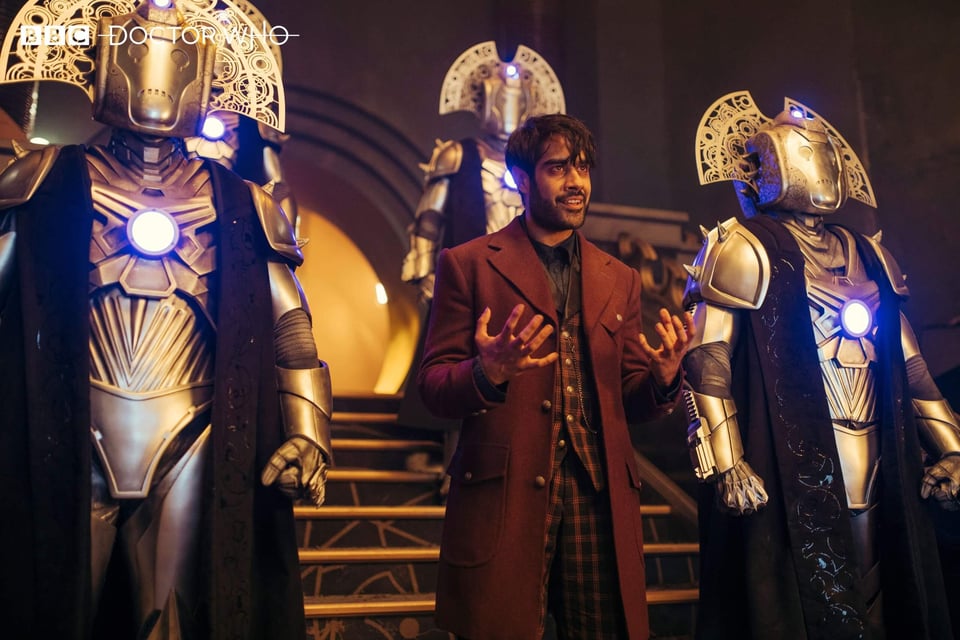
David: Part of me thinks 'all Time Lords come from The Doctor' because that’s how it worked in the real world where they were written as extensions of their deal, but even that would be giving infinitely too much credit; this just wanted to take the literalization of Doctor WHO? to another level. I actually was gonna mow through Ascension, Timeless, and Revolution in one evening, but the first two collectively gave me a stress headache; I knew the high points through osmosis, but it’s a different matter to see it presented with a straight face.
I truly understand now why you’ve been making the comics writer comparisons right along with what we’ve been heading for, because it’s that level of ‘only complete losers could possibly enjoy this’. A situation where the only option is for everyone to ignore it forever, because retconning it would be compounding the core offense of acknowledging it at all.
Sean: In some ways, it’s comparable to the 8th Doctor era’s dealing with “I’m half human. On my mother’s side.” There, the books attempted to engage with the various implications therein of what it meant for the Doctor to be half human. Mostly by highlighting his humanity. Of course, the era ultimately resolved the discrepancy by compounding the issue even further via Lawrence Miles doing all his Faction Paradox stuff. And, with the time that passed, Moffat was able to use it as an implication of Hell Bent and the hybrid.
David: I can’t say I’ll be mad about it going forward, because there’s no way I’m going to watch a good episode of Doctor Who and think ‘and character-wise and thematically, how is this altered by knowing The Doctor is an amnesiac superspy Jesus and THAT’S what their character is really about?’, especially because this episode pauses to have characters declare that none of this matters thematically. But golly. If this had to happen - no it didn’t, in no world did it, but if you’re that dopey and this is your childhood fanfic for the origin of Who mythology you’re gonna make canon now that you have the chance or whatever - then
Obviously The Master should’ve been the one to have to sin-eat this crap. “Ah yes I WAS always superior and important and unfairly manipulated, except by you, my best of enemies” would at least be A Story.
Failing that this should’ve happened to 11, because Matt Smith’s rubber face reacting to this would’ve been pretty funny.
Sidenote: looking all this up caused me to learn about the CARTMEL MASTERPLAN to make sure The Doctor wasn’t a “chump of a Time Lord”, which is inadvertently just about a perfect description of The Doctor.
Sean: The Cartmel Masterplan was less this and more 'The Doctor is a reincarnation of someone important, but in a completely different way' but that was quickly ignored as soon as it was implemented due to appearing at the end of the 7th Doctor era and right before the aforementioned half human bullshit.
David: Timeless Child, Looms, the MASTERPLAN…I get the impulse to gas up your favorite guy, but I just don’t get how Doctor Who needs more than ‘one of the time gods was a real weirdo, and one day they bailed’. That whole (false) climax of Hell Bent you just mentioned is imo practically Moffat pointing and laughing at stuff like this.
Sean: Look, I have 'The weirdo is actually someone important' ideas, but at least I’m not planning on implementing them via a 20 minute powerpoint presentation. At least The History of Crisis and The Great Darkness had Chris Burnham art! This is just pants.
David: You say “at least”, as if him spending his time on that isn’t the worst part.
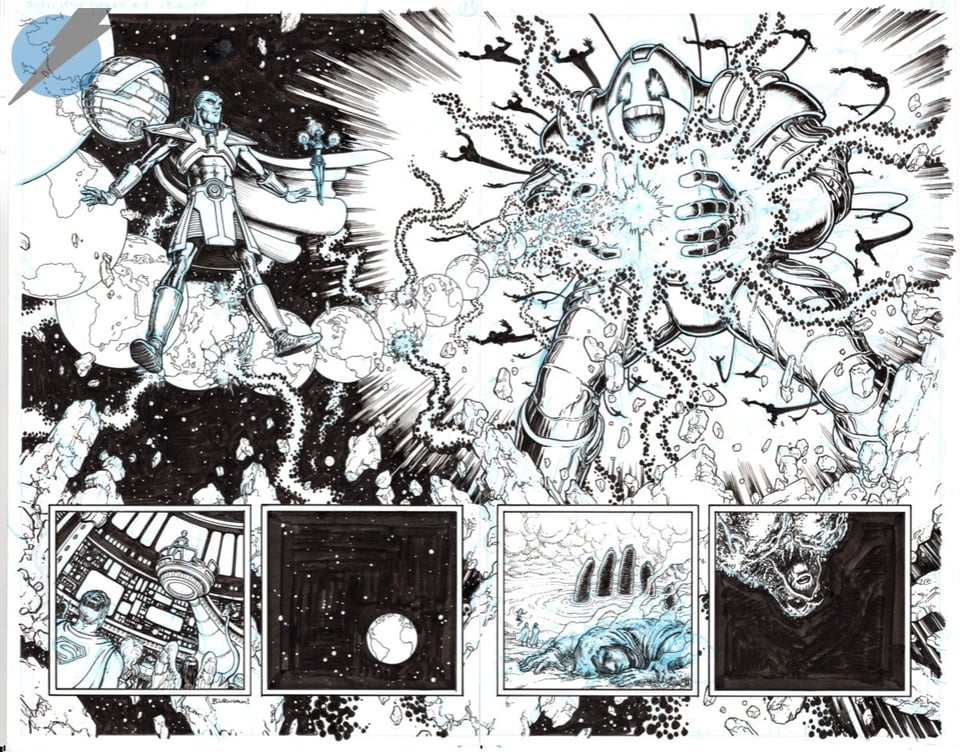
Sean: True. And it’s lesser Burnham art at that.
Also, the Doctor escaping thanks to stock footage fan wank is crap.
David: I’m retroactively almost mad you made me watch Brain of Morbius and thus understood what that 0.7 seconds was about. It’s not that episode’s fault but full-body rejection regardless.
Sean: Yeah, those 0.7 seconds were basically the entire impetus for this episode, as if this was a Star Wars novel about Glup Shitto who is somehow more special than the Jedi because he’s part of a different race of super intelligent weirdos.
David: Behind trying to change the whole narrative engine of what Doctor Who is ‘about’, that might be the biggest act of hubris of the whole thing: assuming The Doctor being from another sci-fi planet besides Gallifrey is some genius idea that’s gonna change the whole game. Maybe they’ll have even dumber hats over there if someone ever goes back to this, but I don’t think that much constitutes a fresh injection of mystery. If the proposition is that Gallifrey and the Time Lords aren’t good enough, do you really think you have a better idea, and moreover if you mean to leave it ambiguous do you really think nobody’s ever gonna be stupid enough to pick at that scab the way you did this?
Sean: At least with Cartmell, the plan was never to reveal what the Masterplan (that didn’t actually exist until the books) was.
Anyways, we have a crap Dalek episode to talk about featuring everyone’s favorite Glup Shitto, Captain Jack Harkness.
David: Jack Harkness is no one’s favorite Glup Shitto.
Sean: Oh, how I wish that was true.
David: Anyway, nothing. Scentless fart of an episode. Dalek cops are another almost half of a story. Potter quote made me bust a gut but I guess this was written in 2020 before it was clear where things were going. Explanation of what the lone Cyberman warning was about made actively negative sense (he already had the Cyberion! They all do! That’s the point!). Who cares? Admittedly I slightly cared because Walsh and Cole carry hard enough I felt the tiniest flicker of something at Graham and Ryan departing. Not enough that I’ll ever think about either again, but credit where it’s due.
Sean: It somehow fucks up 'Daleks are cops,' 'Daleks are working with Theresa May,' and 'Daleks are working with Donald Trump.' And it’s just… nothing. Also, the Harry Potter quote could have easily been replaced with the much better and more apt opening sentence to a Children’s book, “Through the ruin of a city stalked the ruin of a man.”
David: I’m 90% sure the impetus was he heard Warren Ellis’s “We would look out of the window every morning to make sure the bitch hadn’t put Daleks on the streets yet.” crack about Thatcher; whether he’s a comics guy or not, he strikes me as the type to go looking for funny quotes about Doctor Who.
Sean: He’s not Toby Whithouse.
But the good news is… it’s over. We’re done! We’re in the home stretch now! We’ve got Chibnall’s brand spanking new Old White Guy™, Dan, to look forward to.
But first, I think it’s time for a little break from the Chibnall Era. After all, it’s 2020. We’re in Quarantine.
Next Time: Doctor Who in an exciting adventure with Lockdown